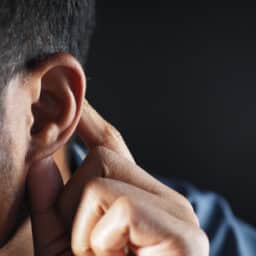Muffled Hearing: Common Causes and Solutions

Muffled hearing can be an annoying symptom preventing you from enjoying your favorite tunes or understanding the subtle dialogue during a movie at the Naples Cinematheque. Learning the common causes of muffled hearing and when to seek professional help can help prevent this annoyance from turning into a constant companion. Common Causes of Muffled Hearing…
Are There Apps for Tinnitus Management

Tinnitus is the perception of a noise, such as ringing or buzzing that is not actually present. Roughly 10% of Americans have experienced tinnitus lasting at least five minutes in the past year. While there’s currently no cure, there are several ways to manage the symptoms, including the use of smartphone applications designed to provide…
What To Know About Ototoxicity

Ototoxicity refers to the adverse reaction to medication that damages the inner ear or auditory nerve. Ototoxic drugs, those capable of causing hearing loss and tinnitus, encompass over 200 medications used to combat serious infections, cancer and heart disease. Although discontinuing the medication might reverse some cases of hearing loss, damage from ototoxic medications can…
Ear Barotrauma: Understanding the Impact on Hearing Health

Experiencing discomfort or pain in your ears during a flight out of Naples Airport or a scuba diving adventure can seem a little strange at first, but it’s actually a symptom of a condition called ear barotrauma. While often temporary and manageable, ear barotrauma can have an impact on your hearing health. Let’s take a…
What Hearing Protection Is Available?

About 18% of adults aged 20–69 have speech frequency hearing loss from exposure to loud noises for five years or more at work. Once you’ve damaged your hearing, you can’t get it back. Therefore, using the right type of protection for the environment you’re in is essential. Types of Hearing Protection Several studies show hearing…
Is There a Connection Between Vaping and Hearing Loss?

Cigarette smoke has been established as a contributor to hearing loss. With many individuals moving to vaping as a substitute for smoking cigarettes, it raises the question of whether vaping has similar effects on hearing loss. There is currently no conclusive evidence linking vaping directly to hearing loss, but there are still harmful effects that could…
Can Eating Healthy Prevent Hearing Loss?

We all know that eating a healthy diet full of fruits and vegetables is good for us. However, what you might not know is that it may also lower your risk of hearing loss. How a Healthy Diet Benefits Your Hearing As we age, our risk of hearing loss increases. There are numerous reasons for…
Can I Reverse My Hearing Loss?

One of the most common questions people have about hearing loss is whether or not it is reversible. While many cases of hearing loss are permanent, others are temporary and can resolve on their own or be reversed with the proper treatment. Temporary Hearing Loss Cases of temporary hearing loss are often due to a…
Is It Your Hearing, or Is It Your TV?
You’re watching the latest episode of your favorite TV show, wrapped up in the story and hanging on each actor’s every word. Suddenly, you can’t make out a sentence, blurt out, “What did she say?” and completely lose the plot. Struggling to hear your TV is a telltale sign of hearing loss. Unfortunately, modern TVs,…
Stanford Teams Collaborate to Solve High-Frequency Hearing Loss
Every hearing profile is unique, and each hearing impairment requires an equally unique solution. Be that as it may, in general, hearing solutions usually fall into two major categories—traditional hearing devices or cochlear implants, both of which are excellent options and help millions of people. However, some people fall into a hearing loss niche proving…
